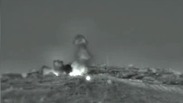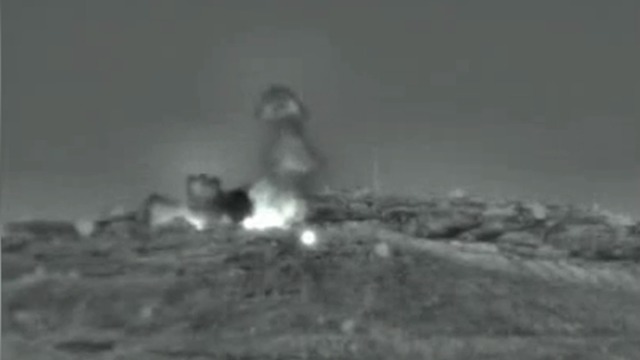
Israel strikes in Syria in response to Golan rocket fire, killing 10
Three soldiers belonging to the Assad regime and 7 foreign nationals died in IAF strikes on Syrian military positions, according to state-run media reports; IDF confirms it struck air defense units, artillery batteries, observation and intelligence posts
State news agency SANA quoted an unnamed military official as saying the attacks struck military positions in the southern region of Quneitra, near the Golan Heights. They also caused material damage, it said.
An Israeli military spokesman confirmed on Twitter that Israel targeted several military positions in Syria. He said the targets included two artillery batteries, several observation and intelligence posts and an SA2 air defense unit.
Prime Minister Benjamin Netanyahu said Sunday he "instructed the IDF to take strong action" in response to the rocket fire, targeting Israel's only ski resort on Mount Hermon.
“We are not prepared to tolerate rocket fire at our territory and will respond with great force to any aggression against us,” said the prime minister. “This has consistently been my policy and this is what we will continue to do for Israel’s security."
The Britain-based Syrian Observatory for Human Rights, an opposition's war monitor, said Israeli warplanes struck positions and an arms depot of Iranian troops and Lebanon's Hezbollah fighters.
The attacks came hours after the Israeli military said two projectiles were fired from Syria toward Mt. Hermon in the Golan Heights.
The Israeli military said Saturday there were no reports of casualties or damage. Israeli media said that sirens warning of incoming rockets were not activated.
Israel has acknowledged carrying out dozens of airstrikes in Syria on Iranian targets and Tehran's allies.
Last week, Israeli aircraft hit a Syrian military post after the army said an anti-aircraft missile was fired at one of its fighter jets. Syrian media said a soldier was killed in that airstrike.
Israel says it will not allow Iran, which has sent forces to help President Bashar Assad in Syria's civil war, to establish a permanent military presence in Syria.
For years, Israel has remained largely silent about its attacks against Iran and its Shiite proxies operating in neighboring Syria. But in recent months, military and political leaders have become increasingly outspoken about these activities.

















